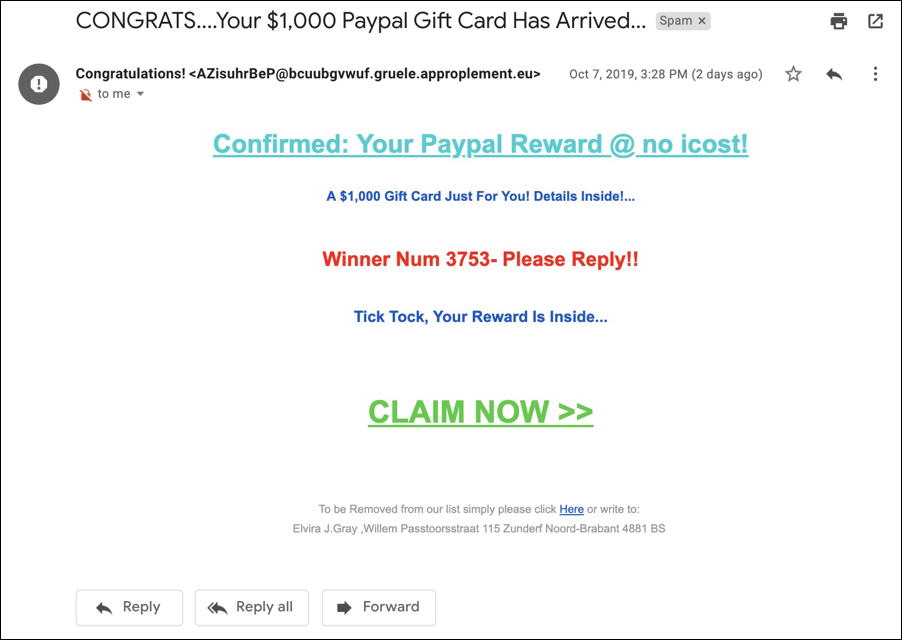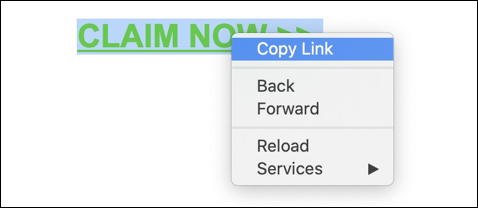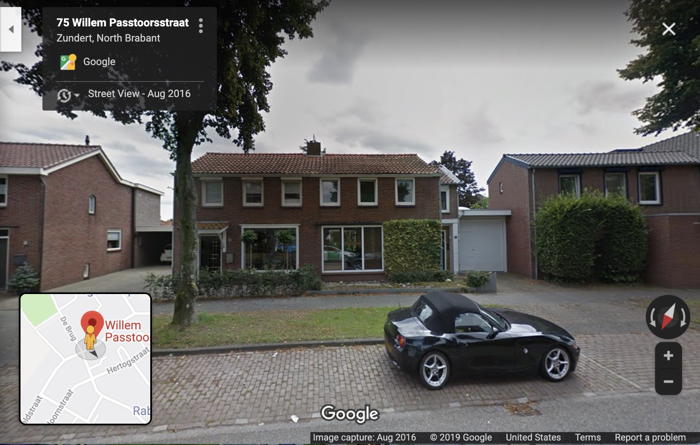Pretty nice, I got an email saying that I’ve won a $1000 gift card from PayPal. I’m afraid to tell my husband as he’ll tell me it’s a scam. But we need the money! Is it legit, Dave?
Wishing doesn’t make something legit and odds are just about 100% that if an email you receive seems too good to be true, it is. A thousand dollar gift card from PayPal is a pretty expensive prize; why would you have won it? Why would someone or some organization be giving away that kind of money? Nope, sorry to say, it’s going to prove to be a scam, but worse, it might involve an attempted identity theft or the installation of software that hijacks your computer for malicious intent.
A lot of email programs have built-in spam and scam filters and scanning systems, including Google’s Gmail service, but sometimes even there a bogus email can sneak through. So I happen to have one in my inbox that’s likely similar to what you received. Your first scepticism filter, even if it’s from a friend, is “is this believable?” If it’s not, stop there and delete it. Your friend who uses a computer once a month to check for email from the grandkids suddenly sends you a must-install program? Not likely.
Second filter to use is “does it seem legit?” and for that you might want to do just a little bit of homework. For example, here’s this email message I received:

All the font colors, sizes and layout is an immediate tip-off to me that this is a scam. If it was a real promotion from a legitimate company, do you think they’d be paying for thousands of gift cards (remember this tells me I’m winner #3753) but can’t figure out how to format it to look professional? There’s more to concern you too, including the awkward “@ no icost!” phrasing. Most damning, however, is that email address address in the sender line. Did you catch it when you looked at the message? The actual sender of this message is:
Congratulations <AZisuhrBeP@bcuubgvwuf.gruele.approplement.eu>
If that doesn’t give you enough information to delete the message without even opening it, well, you need to be WAY more cautious on the modern Internet.
But let’s say that you’re still curious. OK, okay, I get curious. Instead of just clicking on the “CLAIM NOW >>” link, right-click on it (or Control-Click if you’re on a Mac) and you’ll get a menu of options:

Now paste that URL into a Word document or somewhere else where you won’t go to that page. Just to see where it points. In this case, I get this:
https://tinyurl.com/y5couaqq?om=1vct5d9772f6a4bd2o84.twz0u.Z0000rffgglblg7q3_ru872.ffgglMGF6ba2020v6dzj
The TinyURL service is used to mask destination URLs, but I know how to navigate the site safely. It would expand to this site: http://dependedjohn.com/
Strange, eh? Definitely no $1000 PayPal gift card at the end of this journey.
Oh, and just for fun, notice on the very bottom of the scam email is the name Elvira Gray and a physical address. Which you can feed into Google Maps and get a street view. Here it is:

Do you think the scammer lives there? Do you think that’s his or her cute little black convertible? I don’t. But still, hmm….
Regardless of who lives in that red brick house, suffice to say that any time you get an email offering you something for nothing, it’s going to be a scam and likely a dangerous one at that. Remember the acronym TNSTAAFL: There’s No Such Thing as a Free Lunch. And be safe out there!
Pro Tip: I’ve been writing about Internet scams and malicious users for many years. Please check out my Computer Basics tutorials for a lot more help on the subject to help you stay safe while enjoying the online world.

Dave what can you do if you did open that Paypal scam because I did!!!!
First step: Go change your PayPal account password. Then enable 2-step verification to ensure that they’d still need access to your phone to log in and getcha!
As always, Dave,thanks for the tip-off on that scam; your info is ALWAYS SO HELPFUL!
I also received that exact same email, with the same winning number 3753, definitely a scam. Don’t click on anything in this email, just delete it.